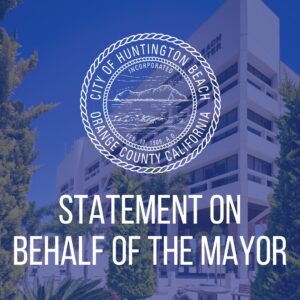Written by Kathie Schey, City Archivist
Huntington Beach has benefited from the contributions of many African Americans who have called it home. Henry Brooks, the first Black graduate of Huntington Beach High School, later served with one of the very few “Negro” regiments allowed to bear arms in WWI. The late Mrs. Barbara Junious, a daughter of the Jim Crow South, offered classes in Surf City about African American history, welcoming all who wished to learn. Many more have enriched our community and helped make our City a better place to live.
Every year at this time, we and others across our nation recognize Black History, which has its roots in an earlier celebration founded in 1926 by Dr. Carter G. Woodson. The son of parents born into slavery, he received his Ph.D. from Harvard University and was the second African American to do so, following W.E.B. Du Bois.
As a trained historian, Dr. Woodson was keenly aware of past events and Black people’s struggles in American society. Recognizing the need to purposely study and document the past, he and Jesse E. Moreland, a prominent minister, formed the Association for the Study of African American History (ASAAH) in 1915. Its original publications – the Journal of African American History and the Black History Bulletin – are still published today.
In 1926, Dr. Woodson created “Negro History Week,” which was celebrated around the February birthdays of Frederick Douglass and Abraham Lincoln. Like the mission of the ASAAH, its purpose was to celebrate and honor the many contributions of Black people, making others aware of it to educate and empower them. Following Emancipation from slavery, the subsequent 1870 ratification of the 15th Amendment allowing Black men to vote (Black women joined them with the passage of the 19th Amendment), and several other legislative mandates, the many subsequent decades were hallmarked by the struggle for civil rights, equality, and fairness in all areas of life. The poll tax intended to limit African American election participation in the South – literacy tests and even intimidation were used to the same effect – was not eliminated until the Voting Rights Act of 1965 was passed.
In 1976, as the United States celebrated its Bicentennial and the contributions of all its citizens, Congress mandated that Dr. Woodson’s week-long event be celebrated for an entire month. President Gerald Ford authored the proclamation, creating “Black History Month.” Every sitting President has done so since. When Ronald Reagan offered his proclamation in 1986, he noted it was also the year Dr. Martin Luther King’s birthday was made a national holiday. Calling Black History “a proving ground for America’s ideals,” President Reagan observed: “The American experience and character can never be fully grasped until the knowledge of Black history assumes its rightful place in our schools and our scholarship.”








